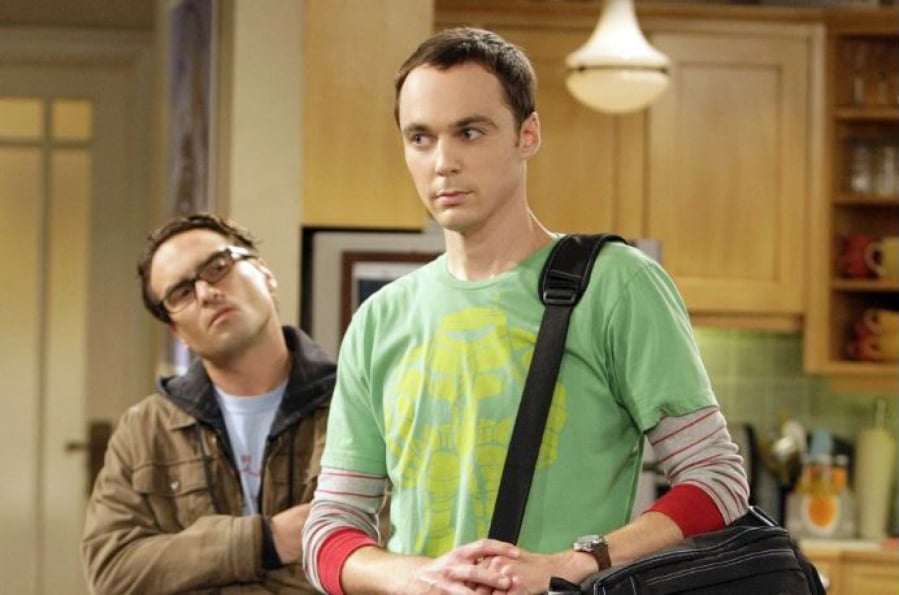We live in the age of the Geek. Geeks are smart. Geeks are funny. Geeks are fun. Geeks make cool stuff and know cool stuff. We could say about them, and probably have, that it’s their world and we’re just passing through.
We have “The Big Bang Theory” to thank for this.
The ascendancy of geekdom has been a long time in coming, in culture and on TV. You know the names because you esteem them — Spock, Lisa Simpson, Steve Urkel, Ross Geller, Abby Sciuto, Adrian Monk — but more often than not the geeks of TV have tended to be second banana as opposed to first banana.
But the order has been reversed, and we have “The Big Bang Theory” to thank for that.
When “Bang” wraps Thursday, after 12 seasons, the geek apotheosis will be complete. To be one on TV now means to be the hero, the object of esteem or fascination.
James Holzhauer of “Jeopardy!” renown owes a small debt of gratitude to Sheldon Cooper as played by Jim Parsons.
How did this happen?
How “Big Bang” got us here is a matter of conjecture and debate. Perhaps it rode a wave that was already cresting, or perhaps it exploited impressions we had already embraced, of the scientist as brilliant social maladroit, of Sheldon writ large. And like some of the science referenced in “Big Bang” — supersymmetry, the Standard Model, quantum entanglement — the secret of this show’s particular sauce resists facile interpretation. It’s either a smart show in plain wrapping, or a by-the-numbers sitcom in smart wrapping. Both? There’s some TV supersymmetry for you.
In any event, “Bang” ends not even remotely as it began, as far and away the most popular show on TV, averaging about 18 million viewers when streaming is factored in. Like a few select commercial TV monsters that preceded — such as “Friends” and “Seinfeld” — this has no apparent sign of diminution. If lead Jim Parsons had not said “enough” (He’s launched his own production company.) there surely would be a 13th season and beyond.
Basic TV at its best
What’s also so rare about “Bang” is that this is a big fish in a rapidly drying pond — a popular multicamera comedy surrounded by comedies that aren’t even necessarily comedies but deep explorations (“The Good Place”) of our beset times (“The Russian Doll”) and political divide (“Veep”) as refracted through a racial (“Atlanta”) or cultural (“Ramy”) lens.
Not good ol’ “Bang.” It’s part of an ancient TV tradition, the network sitcom. It has gathered and held viewers not despite that counterrevolution but because of that counterrevolution. It’s TV for the masses, TV without guilt, TV without heavy lifting, TV without second thoughts or third thoughts or any thoughts. That doesn’t mean it’s dumb TV — far from it — but basic TV. Particle physics gives it cover but only cover: “Bang” would have been different had Raj played by Kunal Nayyar, for example, been a brilliant carpet salesman instead of an astrophysicist.
Like all comedies off the Chuck Lorre assembly line, “The Big Bang” has represented the triumph of the singularly simple idea. The entire plot of each of the last 276 episodes can be summed up in ten words or less — eleven would be too many. Recent examples from this season: Penny’s (Kaley Cuoco) infertile ex-boyfriend and wife turn to Leonard played by Johnny Galecki. Howard’s (Simon Helberg) home alone because Bernadette (Melissa Rauch) is at a convention! Amy (Mayim Bialik) has a meltdown imperiling her Nobel Prize!
That simple plot strand is then twisted around an entanglement of words, jokes, one-offs, side-plots and the occasional abstruse scientific concept. While the words may stray afar, the plot premise never does. “Bang” may dazzle but the basics always apply.
Brilliant casting
And you will have undoubtedly noticed that I’ve just described just about every successful sitcom since “I Love Lucy.” “The Big Bang’s” unique contribution, then, is that cast — a collection of pros who know their marks and especially know their characters. Galecki, Parsons and Bialik were seasoned actors long before they got here. Bialik got her neuroscience doctorate in the process (2007) which lent — even if off-screen — that vital touch of brilliance so necessary to each of these characters.
Penny is the brilliant exception. Cuoco has made her the show’s everyman and woman, our entry point into this world. When “The Big Bang” wanted an offensive dumb-blond stereotype early in its run, Cuoco turned her into the grown-up, the reality principle, and one of two key characters that “Bang” could have never done without.
The other character needs no introduction. Sheldon is the last of the great sitcom characters and Parsons the last of the great sitcom actors — broad but precise, simple but deep, brainy but childlike, annoying but lovable. The geeks rule, and this one in particular. Here’s hoping for that Nobel Prize, old friend. You already got your Emmy.



